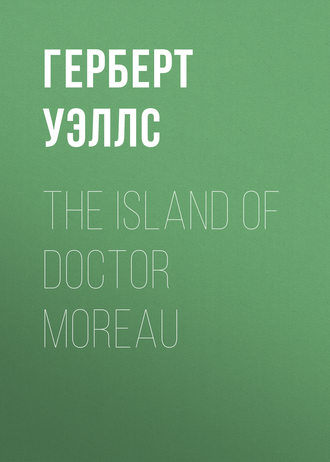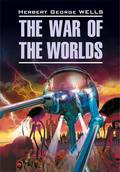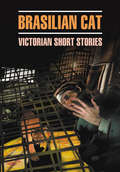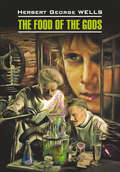
Герберт Джордж Уэллс
The Island of Doctor Moreau
“Don't kill it, Prendick!” cried Moreau. “Don't kill it!” and I saw him stooping as he pushed through under the fronds of the big ferns.
In another moment he had beaten off the Hyena-swine with the handle of his whip, and he and Montgomery were keeping away the excited carnivorous Beast People, and particularly M'ling, from the still quivering body. The hairy-grey Thing came sniffing at the corpse under my arm. The other animals, in their animal ardour, jostled me to get a nearer view.
“Confound you, Prendick!” said Moreau. “I wanted him.”
“I'm sorry,” said I, though I was not. “It was the impulse of the moment.” I felt sick with exertion and excitement. Turning, I pushed my way out of the crowding Beast People and went on alone up the slope towards the higher part of the headland. Under the shouted directions of Moreau I heard the three white-swathed Bull-men begin dragging the victim down towards the water.
It was easy now for me to be alone. The Beast People manifested a quite human curiosity about the dead body, and followed it in a thick knot, sniffing and growling at it as the Bull-men dragged it down the beach. I went to the headland and watched the bull-men, black against the evening sky as they carried the weighted dead body out to sea; and like a wave across my mind came the realisation of the unspeakable aimlessness of things upon the island. Upon the beach among the rocks beneath me were the Ape-man, the Hyena-swine, and several other of the Beast People, standing about Montgomery and Moreau. They were all still intensely excited, and all overflowing with noisy expressions of their loyalty to the Law; yet I felt an absolute assurance in my own mind that the Hyena-swine was implicated in the rabbit-killing. A strange persuasion came upon me, that, save for the grossness of the line, the grotesqueness of the forms, I had here before me the whole balance of human life in miniature, the whole interplay of instinct, reason, and fate in its simplest form. The Leopard-man had happened to go under: that was all the difference. Poor brute!
Poor brutes! I began to see the viler aspect of Moreau's cruelty. I had not thought before of the pain and trouble that came to these poor victims after they had passed from Moreau's hands. I had shivered only at the days of actual torment in the enclosure. But now that seemed to me the lesser part. Before, they had been beasts, their instincts fitly adapted to their surroundings, and happy as living things may be. Now they stumbled in the shackles of humanity, lived in a fear that never died, fretted by a law they could not understand; their mock-human existence, begun in an agony, was one long internal struggle, one long dread of Moreau – and for what? It was the wantonness of it that stirred me.
Had Moreau had any intelligible object, I could have sympathised at least a little with him. I am not so squeamish about pain as that. I could have forgiven him a little even, had his motive been only hate. But he was so irresponsible, so utterly careless! His curiosity, his mad, aimless investigations, drove him on; and the Things were thrown out to live a year or so, to struggle and blunder and suffer, and at last to die painfully. They were wretched in themselves; the old animal hate moved them to trouble one another; the Law held them back from a brief hot struggle and a decisive end to their natural animosities.
In those days my fear of the Beast People went the way of my personal fear for Moreau. I fell indeed into a morbid state, deep and enduring, and alien to fear, which has left permanent scars upon my mind. I must confess that I lost faith in the sanity of the world when I saw it suffering the painful disorder of this island. A blind Fate, a vast pitiless mechanism, seemed to cut and shape the fabric of existence and I, Moreau (by his passion for research), Montgomery (by his passion for drink), the Beast People with their instincts and mental restrictions, were torn and crushed, ruthlessly, inevitably, amid the infinite complexity of its incessant wheels. But this condition did not come all at once: I think indeed that I anticipate a little in speaking of it now.
XVII. A CATASTROPHE
SCARCELY six weeks passed before I had lost every feeling but dislike and abhorrence for this infamous experiment of Moreau's. My one idea was to get away from these horrible caricatures of my Maker's image, back to the sweet and wholesome intercourse of men. My fellow-creatures, from whom I was thus separated, began to assume idyllic virtue and beauty in my memory. My first friendship with Montgomery did not increase. His long separation from humanity, his secret vice of drunkenness, his evident sympathy with the Beast People, tainted him to me. Several times I let him go alone among them. I avoided intercourse with them in every possible way. I spent an increasing proportion of my time upon the beach, looking for some liberating sail that never appeared, – until one day there fell upon us an appalling disaster, which put an altogether different aspect upon my strange surroundings.
It was about seven or eight weeks after my landing, – rather more, I think, though I had not troubled to keep account of the time, – when this catastrophe occurred. It happened in the early morning – I should think about six. I had risen and breakfasted early, having been aroused by the noise of three Beast Men carrying wood into the enclosure.
After breakfast I went to the open gateway of the enclosure, and stood there smoking a cigarette and enjoying the freshness of the early morning. Moreau presently came round the corner of the enclosure and greeted me. He passed by me, and I heard him behind me unlock and enter his laboratory. So indurated was I at that time to the abomination of the place, that I heard without a touch of emotion the puma victim begin another day of torture. It met its persecutor with a shriek, almost exactly like that of an angry virago.
Then suddenly something happened, – I do not know what, to this day. I heard a short, sharp cry behind me, a fall, and turning saw an awful face rushing upon me, – not human, not animal, but hellish, brown, seamed with red branching scars, red drops starting out upon it, and the lidless eyes ablaze. I threw up my arm to defend myself from the blow that flung me headlong with a broken forearm; and the great monster, swathed in lint and with red-stained bandages fluttering about it, leapt over me and passed. I rolled over and over down the beach, tried to sit up, and collapsed upon my broken arm. Then Moreau appeared, his massive white face all the more terrible for the blood that trickled from his forehead. He carried a revolver in one hand. He scarcely glanced at me, but rushed off at once in pursuit of the puma.
I tried the other arm and sat up. The muffled figure in front ran in great striding leaps along the beach, and Moreau followed her. She turned her head and saw him, then doubling abruptly made for the bushes. She gained upon him at every stride. I saw her plunge into them, and Moreau, running slantingly to intercept her, fired and missed as she disappeared. Then he too vanished in the green confusion. I stared after them, and then the pain in my arm flamed up, and with a groan I staggered to my feet. Montgomery appeared in the doorway, dressed, and with his revolver in his hand.
“Great God, Prendick!” he said, not noticing that I was hurt, “that brute's loose! Tore the fetter out of the wall! Have you seen them?” Then sharply, seeing I gripped my arm, “What's the matter?”
“I was standing in the doorway,” said I.
He came forward and took my arm. “Blood on the sleeve,” said he, and rolled back the flannel. He pocketed his weapon, felt my arm about painfully, and led me inside. “Your arm is broken,” he said, and then, “Tell me exactly how it happened – what happened?”
I told him what I had seen; told him in broken sentences, with gasps of pain between them, and very dexterously and swiftly he bound my arm meanwhile. He slung it from my shoulder, stood back and looked at me.
“You'll do,” he said. “And now?”
He thought. Then he went out and locked the gates of the enclosure. He was absent some time.
I was chiefly concerned about my arm. The incident seemed merely one more of many horrible things. I sat down in the deck chair, and I must admit swore heartily at the island. The first dull feeling of injury in my arm had already given way to a burning pain when Montgomery reappeared. His face was rather pale, and he showed more of his lower gums than ever.
“I can neither see nor hear anything of him,” he said. “I've been thinking he may want my help.” He stared at me with his expressionless eyes. “That was a strong brute,” he said. “It simply wrenched its fetter out of the wall.” He went to the window, then to the door, and there turned to me. “I shall go after him,” he said. “There's another revolver I can leave with you. To tell you the truth, I feel anxious somehow.”
He obtained the weapon, and put it ready to my hand on the table; then went out, leaving a restless contagion in the air. I did not sit long after he left, but took the revolver in hand and went to the doorway.
The morning was as still as death. Not a whisper of wind was stirring; the sea was like polished glass, the sky empty, the beach desolate. In my half-excited, half-feverish state, this stillness of things oppressed me. I tried to whistle, and the tune died away. I swore again, – the second time that morning. Then I went to the corner of the enclosure and stared inland at the green bush that had swallowed up Moreau and Montgomery. When would they return, and how? Then far away up the beach a little grey Beast Man appeared, ran down to the water's edge and began splashing about. I strolled back to the doorway, then to the corner again, and so began pacing to and fro like a sentinel upon duty. Once I was arrested by the distant voice of Montgomery bawling, “Coo-ee – Moreau!” My arm became less painful, but very hot. I got feverish and thirsty. My shadow grew shorter. I watched the distant figure until it went away again. Would Moreau and Montgomery never return? Three sea-birds began fighting for some stranded treasure.
Then from far away behind the enclosure I heard a pistol-shot. A long silence, and then came another. Then a yelling cry nearer, and another dismal gap of silence. My unfortunate imagination set to work to torment me. Then suddenly a shot close by. I went to the corner, startled, and saw Montgomery, – his face scarlet, his hair disordered, and the knee of his trousers torn. His face expressed profound consternation. Behind him slouched the Beast Man, M'ling, and round M'ling's jaws were some queer dark stains.
“Has he come?” said Montgomery.
“Moreau?” said I. “No.”
“My God!” The man was panting, almost sobbing. “Go back in,” he said, taking my arm. “They're mad. They're all rushing about mad. What can have happened? I don't know. I'll tell you, when my breath comes. Where's some brandy?”
Montgomery limped before me into the room and sat down in the deck chair. M'ling flung himself down just outside the doorway and began panting like a dog. I got Montgomery some brandy-and-water. He sat staring in front of him at nothing, recovering his breath. After some minutes he began to tell me what had happened.
He had followed their track for some way. It was plain enough at first on account of the crushed and broken bushes, white rags torn from the puma's bandages, and occasional smears of blood on the leaves of the shrubs and undergrowth. He lost the track, however, on the stony ground beyond the stream where I had seen the Beast Man drinking, and went wandering aimlessly westward shouting Moreau's name. Then M'ling had come to him carrying a light hatchet. M'ling had seen nothing of the puma affair; had been felling wood, and heard him calling. They went on shouting together. Two Beast Men came crouching and peering at them through the undergrowth, with gestures and a furtive carriage that alarmed Montgomery by their strangeness. He hailed them, and they fled guiltily. He stopped shouting after that, and after wandering some time farther in an undecided way, determined to visit the huts.
He found the ravine deserted.
Growing more alarmed every minute, he began to retrace his steps. Then it was he encountered the two Swine-men I had seen dancing on the night of my arrival; blood-stained they were about the mouth, and intensely excited. They came crashing through the ferns, and stopped with fierce faces when they saw him. He cracked his whip in some trepidation, and forthwith they rushed at him. Never before had a Beast Man dared to do that. One he shot through the head; M'ling flung himself upon the other, and the two rolled grappling. M'ling got his brute under and with his teeth in its throat, and Montgomery shot that too as it struggled in M'ling's grip. He had some difficulty in inducing M'ling to come on with him. Thence they had hurried back to me. On the way, M'ling had suddenly rushed into a thicket and driven out an under-sized Ocelot-man, also blood-stained, and lame through a wound in the foot. This brute had run a little way and then turned savagely at bay, and Montgomery – with a certain wantonness, I thought – had shot him.
“What does it all mean?” said I.
He shook his head, and turned once more to the brandy.
XVIII. THE FINDING OF MOREAU
WHEN I saw Montgomery swallow a third dose of brandy, I took it upon myself to interfere. He was already more than half fuddled. I told him that some serious thing must have happened to Moreau by this time, or he would have returned before this, and that it behoved us to ascertain what that catastrophe was. Montgomery raised some feeble objections, and at last agreed. We had some food, and then all three of us started.
It is possibly due to the tension of my mind, at the time, but even now that start into the hot stillness of the tropical afternoon is a singularly vivid impression. M'ling went first, his shoulder hunched, his strange black head moving with quick starts as he peered first on this side of the way and then on that. He was unarmed; his axe he had dropped when he encountered the Swine-man. Teeth were his weapons, when it came to fighting. Montgomery followed with stumbling footsteps, his hands in his pockets, his face downcast; he was in a state of muddled sullenness with me on account of the brandy. My left arm was in a sling (it was lucky it was my left), and I carried my revolver in my right. Soon we traced a narrow path through the wild luxuriance of the island, going northwestward; and presently M'ling stopped, and became rigid with watchfulness. Montgomery almost staggered into him, and then stopped too. Then, listening intently, we heard coming through the trees the sound of voices and footsteps approaching us.
“He is dead,” said a deep, vibrating voice.
“He is not dead; he is not dead,” jabbered another.
“We saw, we saw,” said several voices.
“Hullo!” suddenly shouted Montgomery, “Hullo, there!”
“Confound you!” said I, and gripped my pistol.
There was a silence, then a crashing among the interlacing vegetation, first here, then there, and then half-a-dozen faces appeared, – strange faces, lit by a strange light. M'ling made a growling noise in his throat. I recognised the Ape-man: I had indeed already identified his voice, and two of the white-swathed brown-featured creatures I had seen in Montgomery's boat. With these were the two dappled brutes and that grey, horribly crooked creature who said the Law, with grey hair streaming down its cheeks, heavy grey eyebrows, and grey locks pouring off from a central parting upon its sloping forehead, – a heavy, faceless thing, with strange red eyes, looking at us curiously from amidst the green.
For a space no one spoke. Then Montgomery hiccoughed, “Who – said he was dead?”
The Monkey-man looked guiltily at the hairy-grey Thing. “He is dead,” said this monster. “They saw.”
There was nothing threatening about this detachment, at any rate. They seemed awestricken and puzzled.
“Where is he?” said Montgomery.
“Beyond,” and the grey creature pointed.
“Is there a Law now?” asked the Monkey-man. “Is it still to be this and that? Is he dead indeed?”
“Is there a Law?” repeated the man in white. “Is there a Law, thou Other with the Whip?”
“He is dead,” said the hairy-grey Thing. And they all stood watching us.
“Prendick,” said Montgomery, turning his dull eyes to me. “He's dead, evidently.”
I had been standing behind him during this colloquy. I began to see how things lay with them. I suddenly stepped in front of Montgomery and lifted up my voice – “Children of the Law,” I said, “he is not dead!” M'ling turned his sharp eyes on me. “He has changed his shape; he has changed his body,” I went on. “For a time you will not see him. He is – there,” I pointed upward, “where he can watch you. You cannot see him, but he can see you. Fear the Law!”
I looked at them squarely. They flinched.
“He is great, he is good,” said the Ape-man, peering fearfully upward among the dense trees.
“And the other Thing?” I demanded.
“The Thing that bled, and ran screaming and sobbing, – that is dead too,” said the grey Thing, still regarding me.
“That's well,” grunted Montgomery.
“The Other with the Whip—” began the grey Thing.
“Well?” said I.
“Said he was dead.”
But Montgomery was still sober enough to understand my motive in denying Moreau's death. “He is not dead,” he said slowly, “not dead at all. No more dead than I am.”
“Some,” said I, “have broken the Law: they will die. Some have died. Show us now where his old body lies, – the body he cast away because he had no more need of it.”
“It is this way, Man who walked in the Sea,” said the grey Thing.
And with these six creatures guiding us, we went through the tumult of ferns and creepers and tree-stems towards the northwest. Then came a yelling, a crashing among the branches, and a little pink homunculus rushed by us shrieking. Immediately after appeared a monster in headlong pursuit, blood-bedabbled, who was amongst us almost before he could stop his career. The grey Thing leapt aside. M'ling, with a snarl, flew at it, and was struck aside. Montgomery fired and missed, bowed his head, threw up his arm, and turned to run. I fired, and the Thing still came on; fired again, point-blank, into its ugly face. I saw its features vanish in a flash: its face was driven in. Yet it passed me, gripped Montgomery, and holding him, fell headlong beside him and pulled him sprawling upon itself in its death-agony.
I found myself alone with M'ling, the dead brute, and the prostrate man. Montgomery raised himself slowly and stared in a muddled way at the shattered Beast Man beside him. It more than half sobered him. He scrambled to his feet. Then I saw the grey Thing returning cautiously through the trees.
“See,” said I, pointing to the dead brute, “is the Law not alive? This came of breaking the Law.”
He peered at the body. “He sends the Fire that kills,” said he, in his deep voice, repeating part of the Ritual. The others gathered round and stared for a space.
At last we drew near the westward extremity of the island. We came upon the gnawed and mutilated body of the puma, its shoulder-bone smashed by a bullet, and perhaps twenty yards farther found at last what we sought. Moreau lay face downward in a trampled space in a canebrake. One hand was almost severed at the wrist and his silvery hair was dabbled in blood. His head had been battered in by the fetters of the puma. The broken canes beneath him were smeared with blood. His revolver we could not find. Montgomery turned him over. Resting at intervals, and with the help of the seven Beast People (for he was a heavy man), we carried Moreau back to the enclosure. The night was darkling. Twice we heard unseen creatures howling and shrieking past our little band, and once the little pink sloth-creature appeared and stared at us, and vanished again. But we were not attacked again. At the gates of the enclosure our company of Beast People left us, M'ling going with the rest. We locked ourselves in, and then took Moreau's mangled body into the yard and laid it upon a pile of brushwood. Then we went into the laboratory and put an end to all we found living there.







